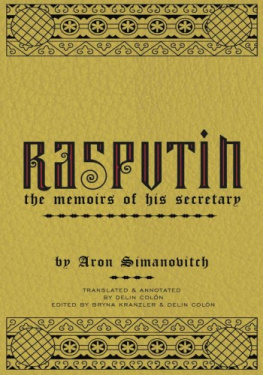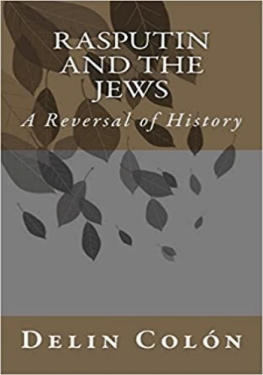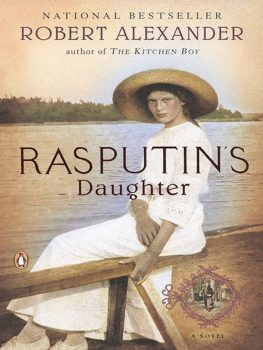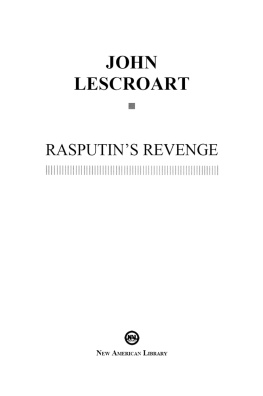RASPUTIN
The Memoirs of his Secretary
by Aron Simanovitch
(aka Aaron Simanovich)
Translated and annotated by Delin Coln
Edited by Delin Coln and Bryna Kranzler
Cover design by Siri Nadler @cargocollective.com/siricreative
Publication and Translation Notes:
Aron Simanovitchs memoir was originally published in Russian (in Riga) in 1928, under the title Rasputin and the Jews . When he moved to Paris, in the 1920s, he had his book translated into French by S. de Leo and Madame de Naglovska. It was published in Paris, in 1930, as Raspoutine par son secrtaire Aron Simanovitch ( Rasputin by his Secretary Aron Simanovitch ) . The book has subsequently been translated into Spanish and Hebrew, as well. In the early 1940s, the Nazis published a heavily revised version of Simanovitchs memoir in German, twisting his words to depict Rasputin as a pawn of the Jews in their so-called conspiracy for world domination.
This is the first English translation. The editing of Simanovitchs manuscript involved reorganizing and consolidating information that was scattered over several chapters. The original French manuscript seems to describe events as he thought of them, rather than by chronology or even topic. In this translation, there is an attempt at chronology within each chapter heading, by topic, rather than cover-to-cover. Many of his two and three-page chapters were consolidated into one, reducing his fifty-six chapters to eleven, while providing continuity, clarity and flow. There were, in addition, many redundancies in the original work which were omitted. His thoughts, assessments and accounts of events remain intact. Simanovitch wrote his memoirs more than a decade after Rasputins death, relying on his memory of people, dates (which are rarely provided), and places.
The annotations (except for one by Simanovitch) are this translators attempt to either place information in context, correct misinformation, or provide background.
~ Delin Coln, great-great niece of Aron Simanovitch
2013 Delin Coln
Delin Coln is also the author of Rasputin and The Jews: A Reversal of History
Contents
Acknowledgements
Foreword
Translators Introduction
Preface by the Author
Chapter I My Introduction to the Imperial Court
Chapter II Rasputins Arrival at the Court
Chapter III The Rumors and The Two Courts
Chapter IV Rasputins Politics
Chapter V The Jewish Question
Chapter VI Rasputin and the Ministers
Chapter VII Assassination Attempts
Chapter VIII After Rasputins Death
Chapter IX Nicholas II
Chapter X After the Fall of the Tsarist Government
Chapter X I Gods Emissary
Appendix
Translators Afterword
Acknowledgements
Since the cover is the public face of a book, as well as the readers first encounter with it, it is only natural that I first thank the designer responsible for this book cover, Siri Nadler of Siri Creative at cargocollective.com/siricreative, a graphic design company based in Nashville, Tennessee . I am ever grateful for her patience, skill, artistry, time and effort in producing a book cover I had not imagined but immediately loved.
Bryna Kranzler, author of The Accidental Anarchist , deserves kudos for her valuable editorial assistance, comments and suggestions. Her guidance, insights and assessments were spot on. I would be remiss if I didnt also thank her for giving my book priority at a time when she was immersed in other projects. Ms. Kranzler did not only edit, but also lent me her strength, courage, motivation and humor when my own were waning. Her assistance and encouragement were priceless.
My husband, David, a lways has my eternal gratitude. His gentle and affectionate efforts to prod me to work kept me from my usual modes of procrastination, and his ability to make me laugh often lent me much needed perspective. He knew just when to give me the solitude to work and when to push me outdoors for a revitalizing whiff of nature. His selfless love and devotion provided me with a nurturing, stress-free environment in which to write.
My belated father, Alex Linowitz, deserves the credit for telling me about his great uncle, Aron Simanovitch, whom I must also thank for hovering in the ether in my early days of translating his work. Whatever his failings as an objective chronicler of history, he is redeemed by his up-close and personal view of Rasputin as a three-dimensional human being with many endearing qualities. Simanovitch was one of the few writers to depict Rasputin as a victim of the aristocracy rather than the other way around.
Foreword
Prophet, healer, mystic.
Libertine, Svengali, scoundrel.
Mention the name Rasputin and even someone without any knowledge of Russian history will have an immediate and visceral reaction.
The image of Gregori Yefimovitch Rasputin that has come down through history is of a man so manipulative and evil that he used his privileged access to Tsar Nicholas II and his Empress, Alexandra, to bring down the Romanov dynasty.
But as any student of human nature knows, the laws of physics dont apply to history: Not every action has an equal and opposite reaction. While Rasputin did, indeed, influence and attempted to influence Tsar Nicholas IIs decisions (as did others, as Nicholas II was so weak-willed that he was often swayed to the last advice he received), had the Tsar heeded Rasputins counsel on more occasions, Russia might not have entered into the Great War, and the Tsar might have lowered the temperature of the brewing revolution.
Just as each generation creates the heroes and villains it needs, Rasputin was a reflection of his unique time and place; had he not existed, someone would have had to invent him. The fact that he cultivated his reputation as filthy and debauched, and flaunted his power only made it easier for those who hated or feared him to demonize him.
Rasputin was introduced to Tsar Nicholas II and Tsarina Alexandra when the Romanovs faced both internal and external threats to their rule, and feared for the life of their son, Tsarevitch Alexei Nikolayevich, whose hemophilia had to be kept from the Russian population. This was a time when Russian society was predisposed toward the mystical, so the arrival of a peasant with mysterious healing powers fit the narrative of the age. Add to these factors that Nicholas II, who ascended to the throne upon his father, Alexander IIIs, assassination, was not psychically strong enough to lead Russia during challenging economic and political times and you have a perfect storm of circumstances that led to the downfall of the dynasty and the 1917 Russian Revolution.
Rasputin: The Memoirs of his Secretary , the translated and annotated diaries of Aron Simanovitch, Rasputins personal secretary and arguably the man who knew him best during his years in Petersburg, makes an important contribution to our understanding of historical events. It reminds that even cataclysmic, history-changing decisions are made by human beings, with all their strengths, flaws and biases, who view the world through a prism constructed of their past experiences and whose light is refracted by their personal desires. This gives readers the opportunity to judge Rasputin and his actions for themselves, while at the same time presenting an insiders view of Peyton Place in Petersburg.
If Rasputin: The Memoirs of his Secretary were a work of fiction, Aron Simanovitch might be considered an unreliable narrator. He contradicts himself, and acknowledges that he aligned himself with Rasputin for personal motives to enhance his business as a jeweler, and to improve the lot of his fellow Jews. However, his proximity to Rasputin gave Simanovitch unique access and insight into events and discussions that rarely become part of the historical record. By translating and annotating her great-great uncles diaries to expose the humanity of historical personages who, for most people, exist only in textbooks, Delin Coln has provided readers with the color commentary on a unique period of history.
Next page








